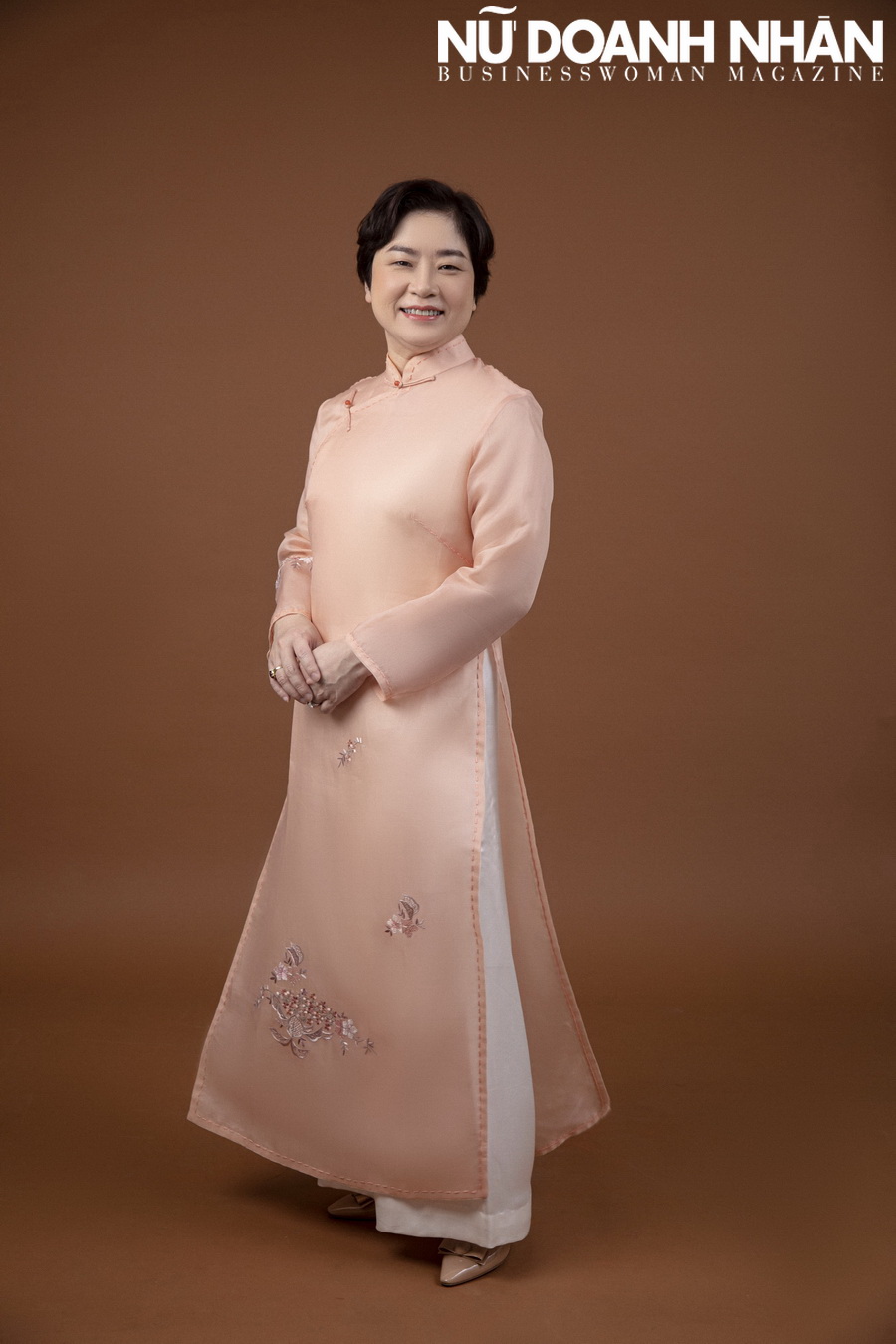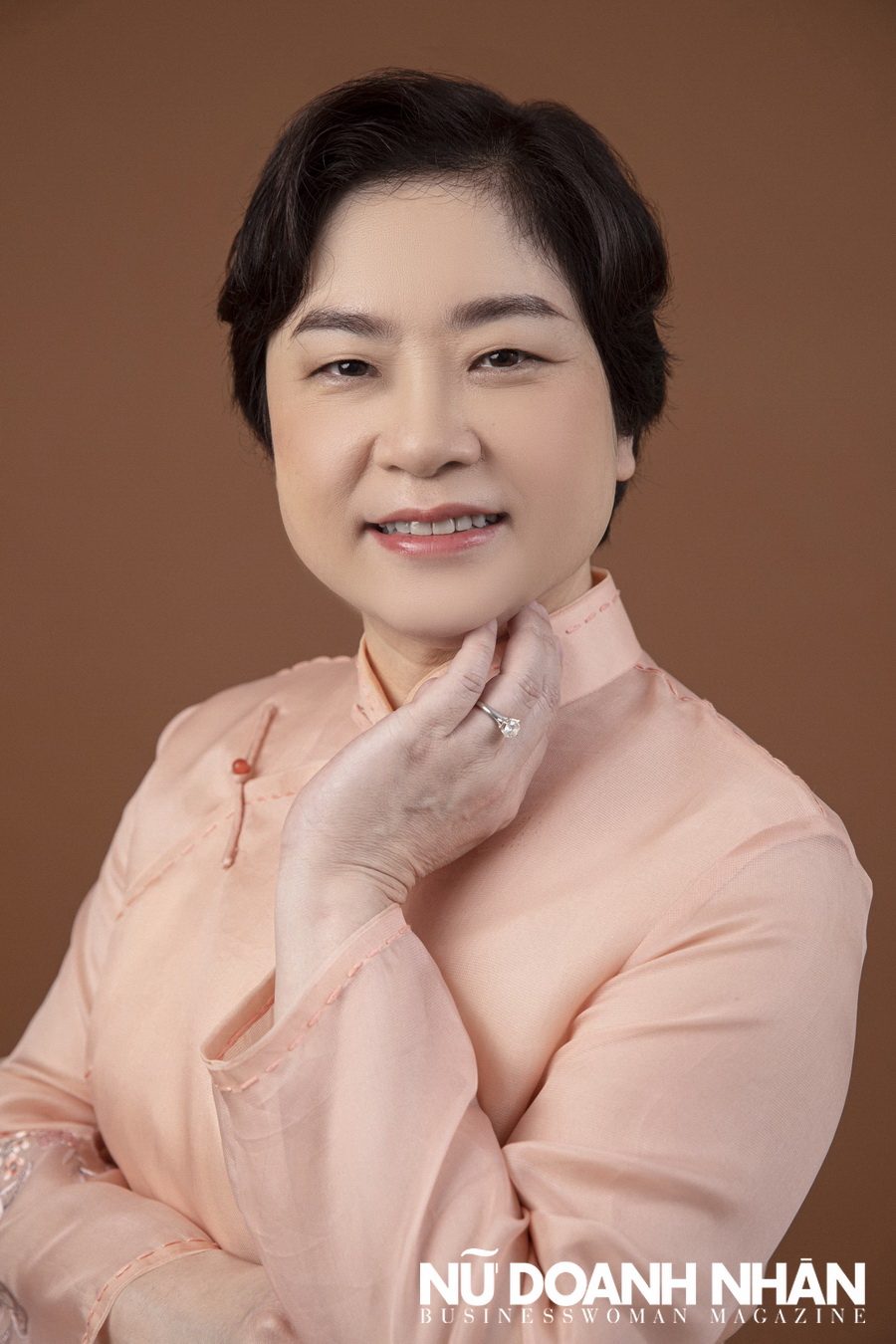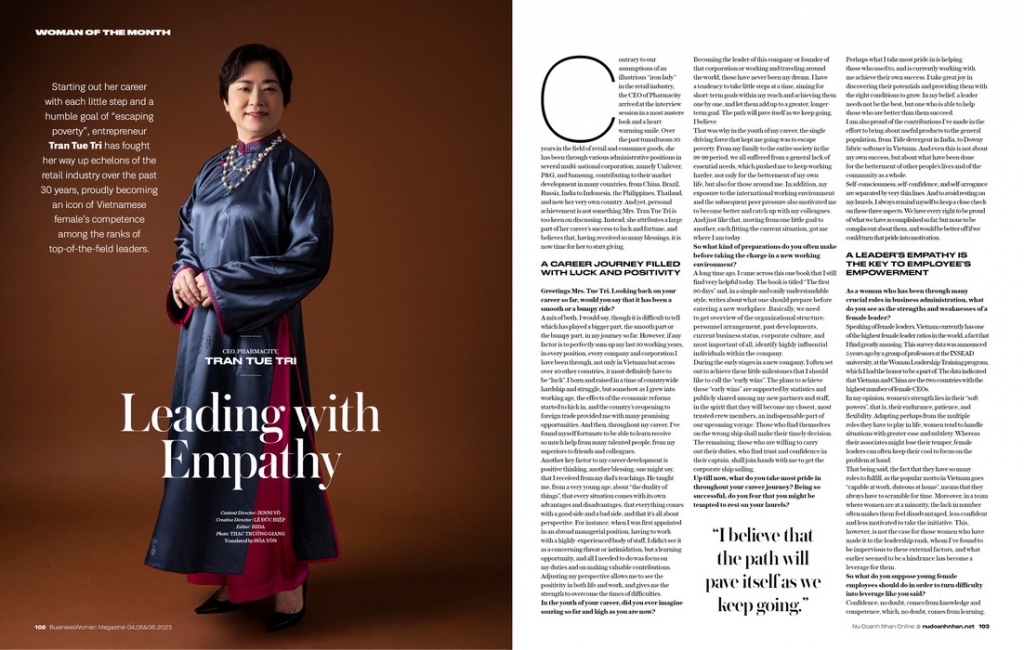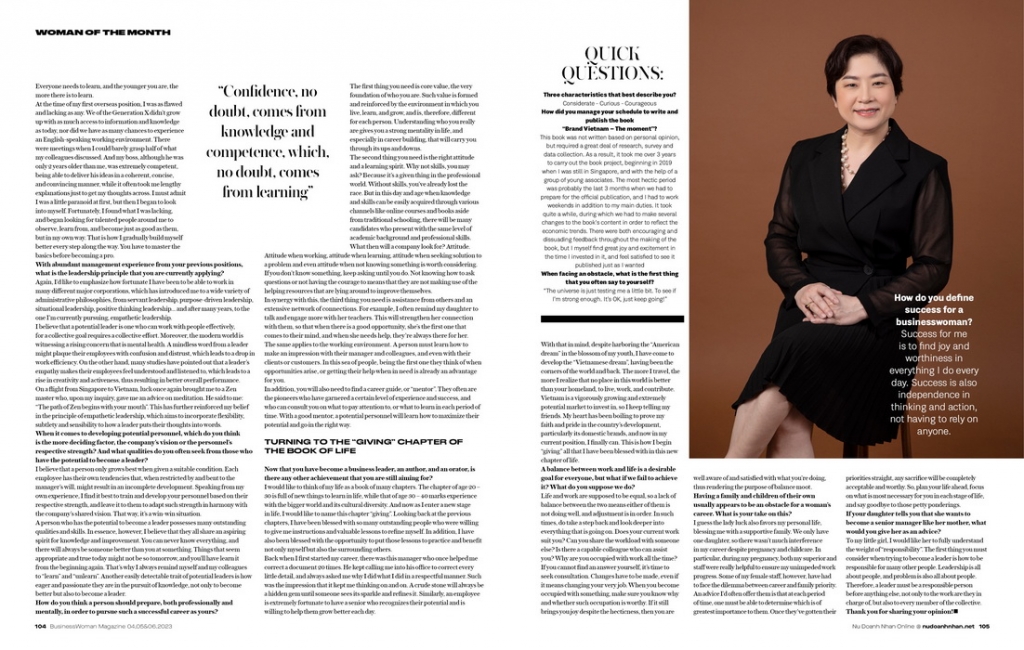Starting out her career with each little step and a humble goal of “escaping poverty”, entrepreneur Trần Tuệ Tri has fought her way up echelons of the retail industry over the past 30 years, proudly becoming an icon of Vietnamese female’s competence among the ranks of top-of-the-field leaders.
Contrary to our assumptions of an illustrious “iron lady” in the retail industry, the CEO of Pharmacity arrived at the interview session in a most austere look and a heart-warming smile. Over the past tumultuous 30 years in the field of retail and consumer goods, she has been through various administrative positions in several multi-national corporation, namely Unilever, P&G, and Samsung, contributing to their market development in many countries, from China, Brazil, Russia, India to Indonesia, the Philippines, Thailand, and now her very own country. And yet, personal achievement is not something Mrs. Trần Tuệ Tri is too keen on discussing. Instead, she attributes a large part of her career’s success to luck and fortune, and believes that, having received so many blessings, it is now time for her to start giving.
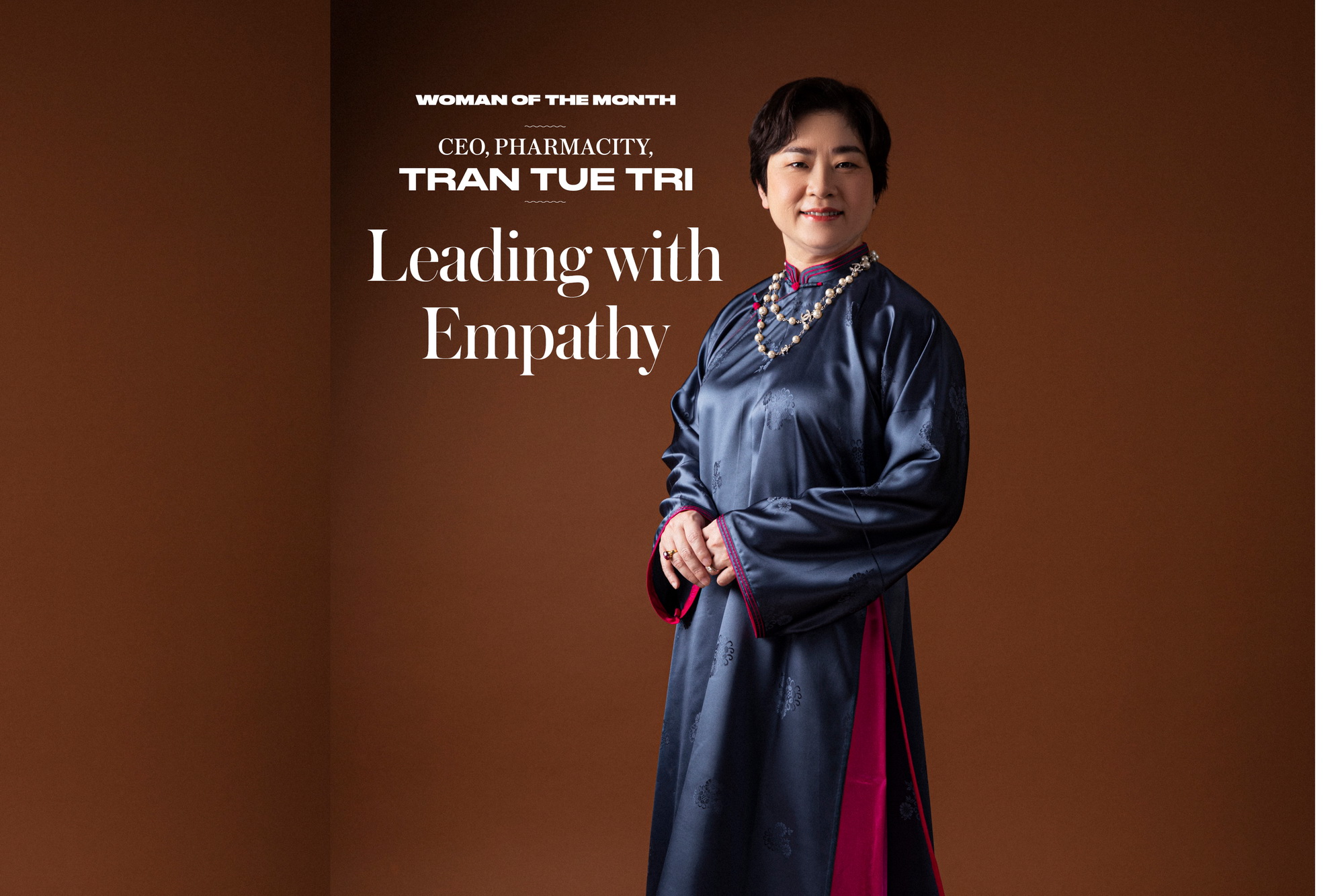
A career journey filled with luck and positivity
Greetings Mrs. Tuệ Tri. Looking back on your career so far, would you say that it has been a smooth or a bumpy ride?
A mix of both, I would say, though it is difficult to tell which has played a bigger part, the smooth part or the bumpy part, in my journey so far. However, if any factor is to perfectly sum up my last 30 working years, in every position, every company and corporation I have been through, not only in Vietnam but across over 40 other countries, it most definitely have to be “luck”. I born and raised in a time of countrywide hardship and struggle, but somehow as I grew into working age, the effects of the economic reforms started to kick in, and the country’s reopening to foreign trade provided me with many promising opportunities. And then, throughout my career, I’ve found myself fortunate to be able to learn receive so much help from many talented people, from my superiors to friends and colleagues.
Another key factor to my career development is positive thinking, another blessing, one might say, that I received from my dad’s teachings. He taught me, from a very young age, about “the duality of things”, that every situation comes with its own advantages and disadvantages, that everything comes with a good side and a bad side, and that it’s all about perspective. For instance, when I was first appointed in an abroad managerial position, having to work with a highly-experienced body of staff, I didn’t see it as a concerning threat or intimidation, but a learning opportunity, and all I needed to do was focus on my duties and on making valuable contributions. Adjusting my perspective allows me to see the positivity in both life and work, and gives me the strength to overcome the times of difficulties.
In the youth of your career, did you ever imagine soaring so far and high as you are now?
Becoming the leader of this company or founder of that corporation or working and traveling around the world, those have never been my dream. I have a tendency to take little steps at a time, aiming for short-term goals within my reach and achieving them one by one, and let them add up to a greater, longer-term goal. The path will pave itself as we keep going, I believe.
That was why in the youth of my career, the single driving force that kept me going was to escape poverty. From my family to the entire society in the 98-99 period, we all suffered from a general lack of essential needs, which pushed me to keep working harder, not only for the betterment of my own life, but also for those around me. In addition, my exposure to the international working environment and the subsequent peer pressure also motivated me to become better and catch up with my colleagues. And just like that, moving from one little goal to another, each fitting the current situation, got me where I am today.
“I believe that the path will pave itself as we keep going.”

So what kind of preparations do you often make before taking the charge in a new working environment?
A long time ago, I came across this one book that I still find very helpful today. The book is titled “The first 90 days” and, in a simple and easily understandable style, writes about what one should prepare before entering a new workplace. Basically, we need to get overview of the organizational structure, personnel arrangement, past developments, current business status, corporate culture, and most important of all, identify highly influential individuals within the company.
During the early stages in a new company, I often set out to achieve these little milestones that I should like to call the “early wins”. The plans to achieve these “early wins” are supported by statistics and publicly shared among my new partners and staff, in the spirit that they will become my closest, most trusted crew members, an indispensable part of our upcoming voyage. Those who find themselves on the wrong ship shall make their timely decision. The remaining, those who are willing to carry out their duties, who find trust and confidence in their captain, shall join hands with me to get the corporate ship sailing.
Up till now, what do you take most pride in throughout your career journey? Being so successful, do you fear that you might be tempted to rest on your laurels?
Perhaps what I take most pride in is helping those who used to, and is currently working with me achieve their own success. I take great joy in discovering their potentials and providing them with the right conditions to grow. In my belief, a leader needs not be the best, but one who is able to help those who are better than them succeed.
I am also proud of the contributions I’ve made in the effort to bring about useful products to the general population, from Tide detergent in India, to Downy fabric softener in Vietnam. And even this is not about my own success, but about what have been done for the betterment of other people’s lives and of the community as a whole.
Self-consciousness, self-confidence, and self-arrogance are separated by very thin lines. And to avoid resting on my laurels, I always remind myself to keep a close check on these three aspects. We have every right to be proud of what we have accomplished so far, but none to be complacent about them, and would be better off if we could turn that pride into motivation.
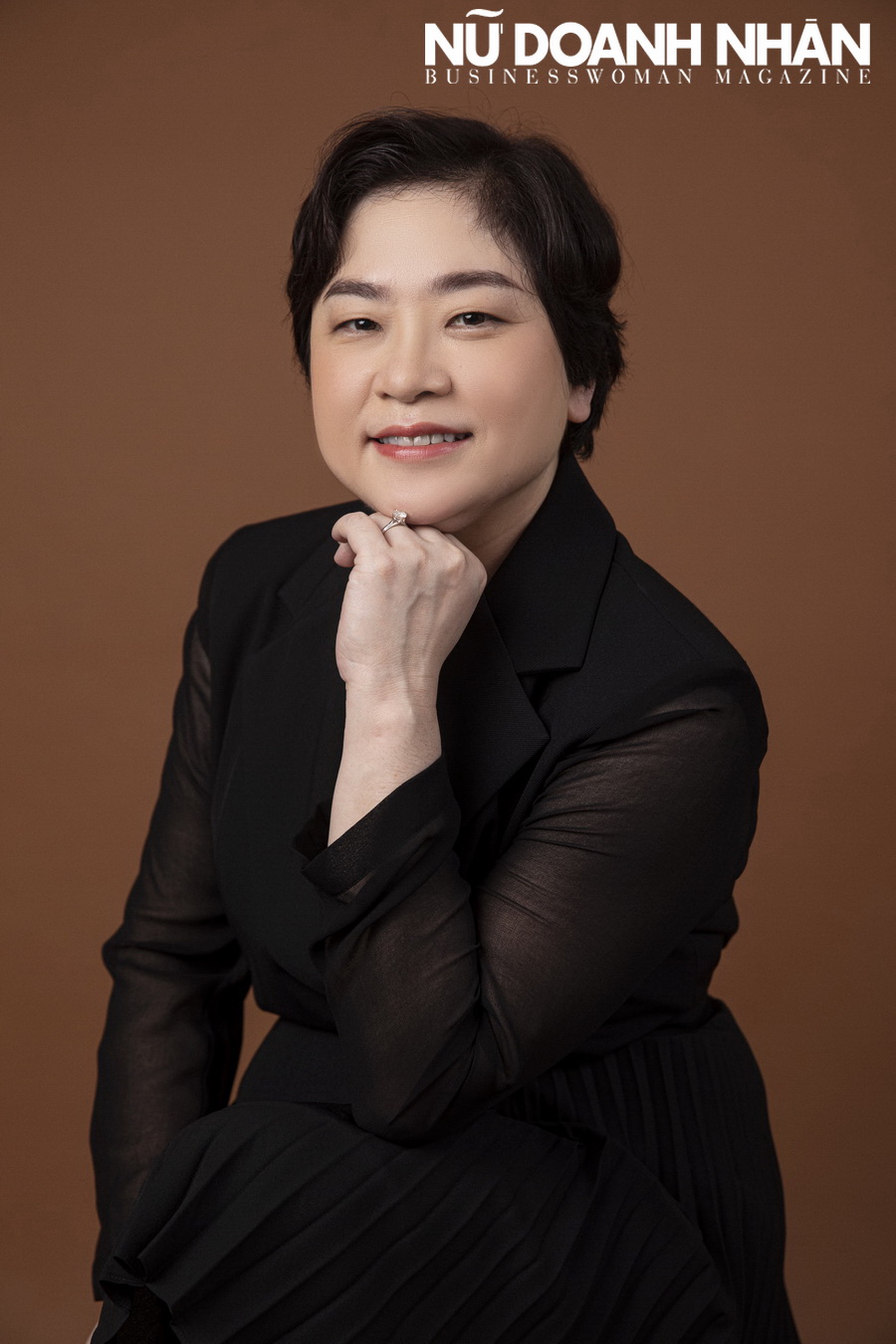
A leader’s empathy is the key to employee’s empowerment
As a woman who has been through many crucial roles in business administration, what do you see as the strengths and weaknesses of a female leader?
Speaking of female leaders, Vietnam currently has one of the highest female leader ratios in the world, a fact that I find greatly amusing. This survey data was announced 5 years ago by a group of professors at the INSEAD university, at the Woman Leadership Training program, which I had the honor to be a part of. The data indicated that Vietnam and China are the two countries with the highest number of female CEOs.
In my opinion, women’s strength lies in their “soft powers”, that is, their endurance, patience, and flexibility. Adapting perhaps from the multiple roles they have to play in life, women tend to handle situations with greater ease and subtlety. Whereas their associates might lose their temper, female leaders can often keep their cool to focus on the problem at hand.
That being said, the fact that they have so many roles to fulfill, as the popular motto in Vietnam goes “capable at work, duteous at home”, means that they always have to scramble for time. Moreover, in a team where women are at a minority, the lack in number often makes them feel disadvantaged, less confident and less motivated to take the initiative. This, however, is not the case for those women who have made it to the leadership rank, whom I’ve found to be impervious to these external factors, and what earlier seemed to be a hindrance has become a leverage for them.
So what do you suppose young female employees should do in order to turn difficulty into leverage like you said?
Confidence, no doubt, comes from knowledge and competence, which, no doubt, comes from learning. Everyone needs to learn, and the younger you are, the more there is to learn.
At the time of my first overseas position, I was as flawed and lacking as any. We of the Generation X didn’t grow up with as much access to information and knowledge as today, nor did we have as many chances to experience an English-speaking working environment. There were meetings when I could barely grasp half of what my colleagues discussed. And my boss, although he was only 2 years older than me, was extremely competent, being able to deliver his ideas in a coherent, concise, and convincing manner, while it often took me lengthy explanations just to get my thoughts across. I must admit I was a little paranoid at first, but then I began to look into myself. Fortunately, I found what I was lacking, and began looking for talented people around me to observe, learn from, and become just as good as them, but in my own way. That is how I gradually build myself better every step along the way. You have to master the basics before becoming a pro.
“A leader needs not be the best, but one who is able to help those who are better than them succeed”
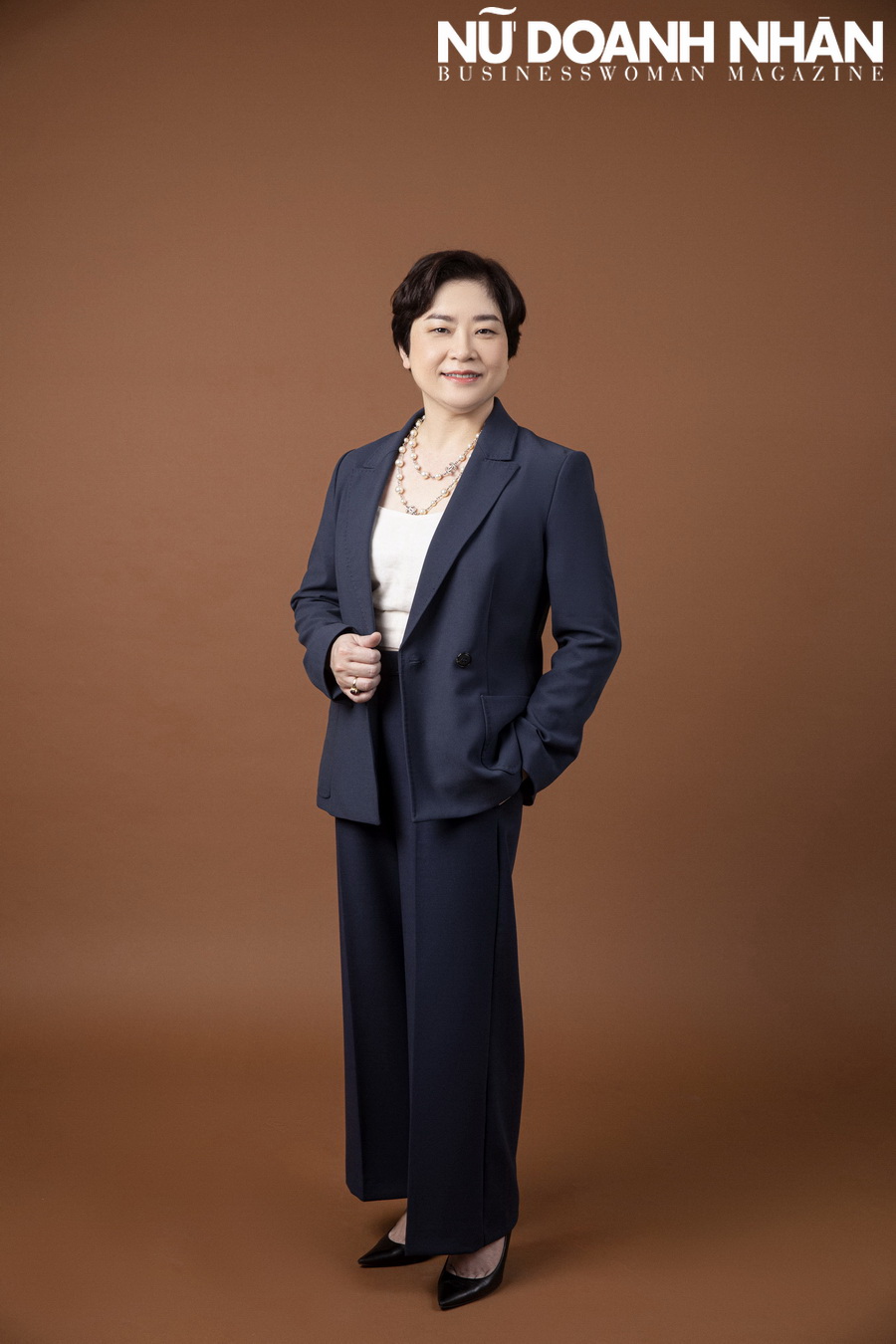
With abundant management experience from your previous positions, what is the leadership principle that you are currently applying?
Again, I’d like to emphasize how fortunate I have been to be able to work in many different major corporations, which has introduced me to a wide variety of administrative philosophies, from servant leadership, purpose-driven leadership, situational leadership, positive thinking leadership… and after many years, to the one I’m currently pursuing, empathetic leadership.
I believe that a potential leader is one who can work with people effectively, for a collective goal requires a collective effort. Moreover, the modern world is witnessing a rising concern that is mental health. A mindless word from a leader might plaque their employees with confusion and distrust, which leads to a drop in work efficiency. On the other hand, many studies have pointed out that a leader’s empathy makes their employees feel understood and listened to, which leads to a rise in creativity and activeness, thus resulting in better overall performance.
On a flight from Singapore to Vietnam, luck once again brought me to a Zen master who, upon my inquiry, gave me an advice on meditation. He said to me: “The path of Zen begins with your mouth”. This has further reinforced my belief in the principle of empathetic leadership, which aims to incorporate flexibility, subtlety and sensibility to how a leader puts their thoughts into words.
When it comes to developing potential personnel, which do you think is the more deciding factor, the company’s vision or the personnel’s respective strength? And what qualities do you often seek from those who have the potential to become a leader?
I believe that a person only grows best when given a suitable condition. Each employee has their own tendencies that, when restricted by and bent to the manager’s will, might result in an incomplete development. Speaking from my own experience, I find it best to train and develop your personnel based on their respective strength, and leave it to them to adapt such strength in harmony with the company’s shared vision. That way, it’s a win-win situation.
A person who has the potential to become a leader possesses many outstanding qualities and skills. In essence, however, I believe that they all share an aspiring spirit for knowledge and improvement. You can never know everything, and there will always be someone better than you at something. Things that seem appropriate and true today might not be so tomorrow, and you’ll have learn it from the beginning again. That’s why I always remind myself and my colleagues to “learn” and “unlearn”. Another easily detectable trait of potential leaders is how eager and passionate they are in the pursuit of knowledge, not only to become better but also to become a leader.
How do you think a person should prepare, both professionally and mentally, in order to pursue such a successful career as yours?
The first thing you need is core value, the very foundation of who you are. Such value is formed and reinforced by the environment in which you live, learn, and grow, and is, therefore, different for each person. Understanding who you really are gives you a strong mentality in life, and especially in career building, that will carry you through its ups and downs.
The second thing you need is the right attitude and a learning spirit. Why not skills, you may ask? Because it’s a given thing in the professional world. Without skills, you’ve already lost the race. But in this day and age when knowledge and skills can be easily acquired through various channels like online courses and books aside from traditional schooling, there will be many candidates who present with the same level of academic background and professional skills. What then will a company look for? Attitude. Attitude when working, attitude when learning, attitude when seeking solution to a problem and even attitude when not knowing something is worth considering. If you don’t know something, keep asking until you do. Not knowing how to ask questions or not having the courage to means that they are not making use of the helping resources that are lying around to improve themselves.
In synergy with this, the third thing you need is assistance from others and an extensive network of connections. For example, I often remind my daughter to talk and engage more with her teachers. This will strengthen her connection with them, so that when there is a good opportunity, she’s the first one that comes to their mind, and when she needs help, they’re always there for her. The same applies to the working environment. A person must learn how to make an impression with their manager and colleagues, and even with their clients or customers. In this sea of people, being the first one they think of when opportunities arise, or getting their help when in need is already an advantage for you.
In addition, you will also need to find a career guide, or “mentor”. They often are the pioneers who have garnered a certain level of experience and success, and who can consult you on what to pay attention to, or what to learn in each period of time. With a good mentor, a potential personnel will learn how to maximize their potential and go in the right way.
“We have every right to be proud of what we have accomplished so far, but none to be complacent about them, and would be better off if we could turn that pride into motivation.”
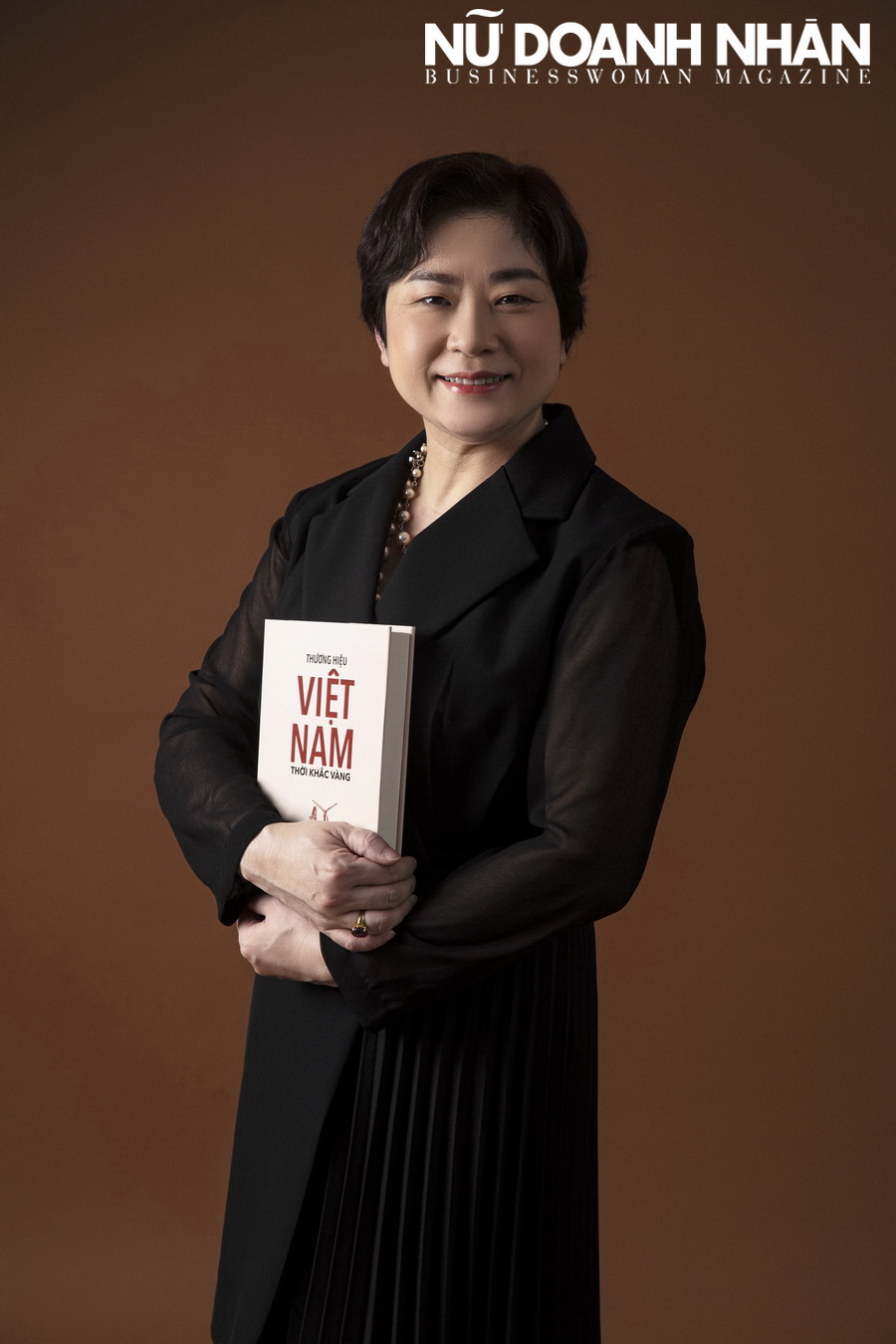
Turning to the “giving” chapter of the book of life
Now that Tue Tri have become a business leader, an author, and an orator, is there any other achievement that you are still aiming for?
I would like to think of my life as a book of many chapters. The chapter of age 20 – 30 is full of new things to learn in life, while that of age 30 – 40 marks experience with the bigger world and its cultural diversity. And now as I enter a new stage in life, I would like to name this chapter “giving”. Looking back at the previous chapters, I have been blessed with so many outstanding people who were willing to give me instructions and valuable lessons to refine myself. In addition, I have also been blessed with the opportunity to put those lessons to practice and benefit not only myself but also the surrounding others.
Back when I first started my career, there was this manager who once helped me correct a document 20 times. He kept calling me into his office to correct every little detail, and always asked me why I did what I did in a respectful manner. Such was the impression that it kept me thinking on and on. A crude stone will always be a hidden gem until someone sees its sparkle and refines it. Similarly, an employee is extremely fortunate to have a senior who recognizes their potential and is willing to help them grow better each day.
With that in mind, despite harboring the “American dream” in the blossom of my youth, I have come to develop the “Vietnamese dream”, having been the corners of the world and back. The more I travel, the more I realize that no place in this world is better than your homeland, to live, work, and contribute. Vietnam is a vigorously growing and extremely potential market to invest in, so I keep telling my friends. My heart has been boiling to prove my faith and pride in the country’s development, particularly its domestic brands, and now in my current position, I finally can. This is how I begin “giving” all that I have been blessed with in this new chapter of life.
A balance between work and life is a desirable goal for everyone, but what if we fail to achieve it? What do you suppose we do?
Life and work are supposed to be equal, so a lack of balance between the two means either of them is not doing well, and adjustment is in order. In such times, do take a step back and look deeper into everything that is going on. Does your current work suit you? Can you share the workload with someone else? Is there a capable colleague who can assist you? Why are you occupied with work all the time?
If you cannot find an answer yourself, it’s time to seek consultation. Changes have to be made, even if it means changing your very job. When you become occupied with something, make sure you know why and whether such occupation is worthy. If it still brings you joy despite the hecticness, then you are well aware of and satisfied with what you’re doing, thus rendering the purpose of balance moot.
“Confidence, no doubt, comes from knowledge and competence, which, no doubt, comes from learning”
Having a family and children of their own usually appears to be an obstacle for a woman’s career. What is your take on this?
I guess the lady luck also favors my personal life, blessing me with a supportive family. We only have one daughter, so there wasn’t much interference in my career despite pregnancy and childcare. In particular, during my pregnancy, both my superior and staff were really helpful to ensure my unimpeded work progress. Some of my female staff, however, have had to face the dilemma between career and family priority. An advice I’d often offer them is that at each period of time, one must be able to determine which is of greatest importance to them. Once they’ve gotten their priorities straight, any sacrifice will be completely acceptable and worthy. So, plan your life ahead, focus on what is most necessary for you in each stage of life, and say goodbye to those petty ponderings.
If your daughter tells you that she wants to become a senior manager like her mother, what would you give her as an advice?
To my little girl, I would like her to fully understand the weight of “responsibility”. The first thing you must consider when trying to become a leader is how to be responsible for many other people. Leadership is all about people, and problem is also all about people. Therefore, a leader must be a responsible person before anything else, not only to the work are they in charge of, but also to every member of the collective.
Thank you for sharing your opinion, Mrs. Tue Tri!
***
How do you define success for a businesswoman?
Success for me is to find joy and worthiness in everything I do every day. Success is also independence in thinking and action, not having to rely on anyone.
***
Quick Questions:
1. Three characteristics that best describe you? Considerate – Curious – Courageous
2. How did you manage your schedule to write and publish the book “Brand Vietnam – The moment”? This book was not written based on personal opinion, but required a great deal of research, survey and data collection. As a result, it took me over 3 years to carry out the book project, beginning in 2019 when I was still in Singapore, and with the help of a group of young associates. The most hectic period was probably the last 3 months when we had to prepare for the official publication, and I had to work weekends in addition to my main duties. It took quite a while, during which we had to make several changes to the book’s content in order to reflect the economic trends. There were both encouraging and dissuading feedback throughout the making of the book, but I myself find great joy and excitement in the time I invested in it, and feel satisfied to see it published just as I wanted
3. When facing an obstacle, what is the first thing that you often say to yourself? “The universe is just testing me a little bit. To see if I’m strong enough. It’s OK, just keep going!”
***
Published on BusinessWoman Magazine No.144.2023 | Content Director: JENNI VÕ | Creative Director: LÊ ĐỨC HIỆP | Editor: HIDA | Translated by HÒA TÔN | Photo: THẠC TRƯỜNG GIANG

Read more:


